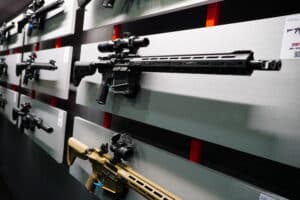The Supreme Court of the United States (SCOTUS) has accepted Smith & Wesson’s request to decide whether Mexico’s suit against the gunmaker should be tossed out.
On Friday, SCOTUS granted cert in Smith & Wesson v. Mexico. The case centers on the foreign government’s claim that the American firearms industry writ large, and Smith & Wesson in particular, is responsible for cartel violence south of the border. The Court will decide whether that claim is viable under the federal Protection of Lawful Commerce in Arms Act (PLCAA).
The central questions in the case do not directly deal with the Second Amendment, instead focusing on whether the gun industry’s actions can be legally connected to harms inflicted by criminal cartels in another country. However, Smith & Wesson argued in its petition to The Court that the suit directly impacts the constitutional right to keep and bear arms because Mexico’s goal is to effectively outlaw the sale of certain popular firearms in the United States.
“Simply put, Mexico detests the American system that makes firearms readily available to law-abiding citizens in accordance with the Second Amendment,” the company said in its filing. “It makes no secret of its view that ordinary citizens should not be allowed to buy an AR-15 or a firearm capable of holding over ten rounds. And it finds abhorrent how law-abiding Americans have the liberty to obtain such firearms without having to beg for the government’s grace. ”
The outcome of the case could have a significant effect on lawsuits that seek to hold gun companies responsible for criminal acts of third parties that use their products. There has been a resurgence of suits like that since the families of Sandy Hook victims successfully settled a case against the now-defunct Remington Arms after SCOTUS declined to take up a similar request to intervene from that company. If SCOTUS allows Mexico’s suit to move forward, it will likely motivate many more plaintiffs to file cases against the gun industry. If not, it could have the exact opposite effect.
Smith & Wesson appealed to the Supreme Court after a three-judge panel of the First Circuit Court of Appeals gave the $10 billion civil liability suit a green light. That court reversed a district judge’s ruling that the PLCAA foreclosed Mexico’s claims. Instead, the panel concluded Mexico’s suit fit into one of the carveouts Congress included in the PLCAA’s liability shield.
“We agree that the PLCAA’s limitations on the types of lawsuits that may be maintained in the United States apply to lawsuits initiated by foreign governments for harm suffered outside the United States,” Judge William J. Kayatta wrote. “However, we also hold that Mexico’s complaint plausibly alleges a type of claim that is statutorily exempt from the PLCAA’s general prohibition.”
Judge Kayatta, a Barack Obama appointee, ruled Mexico’s claim that American gun makers are “aiding and abetting” illegal firearm sales is allowed under the law.
“Fairly read, the complaint alleges that defendants are aware of the significant demand for their guns among the Mexican drug cartels, that they can identify which of their dealers are responsible for the illegal sales that give the cartels the guns, and that they know the unlawful sales practices those dealers engage in to get the guns to the cartels,” he wrote. “It is therefore not implausible that, as the complaint alleges, defendants engage in all this conduct in order to maintain the unlawful market in Mexico, and not merely in spite of it.”
Smith & Wesson told SCOTUS the First Circuit’s ruling “brazenly defies” established precedent and “threatens severe consequences.”
“Absent this Court’s intervention, Mexico’s multi-billion-dollar suit will hang over the American firearms industry for years, inflicting costly and intrusive discovery at the hands of a foreign sovereign that is trying to bully the industry into adopting a host of gun-control measures that have been repeatedly rejected by American voters,” the company wrote. “Worse, so long as the decision below remains good law, scores of similar suits are destined to follow from other governments, both foreign and domestic—all seeking to distract from their own political failings by laying the blame for criminal violence at the feet of the American firearms industry.”
The gun company argued it was vital for The Court to intervene at this point because of what effect fighting the case on the merits, even if it’s eventually successful, could have.
“Even if ultimately unsuccessful, the costs of that litigation will be devastating—not only for defendants, but more importantly for the millions of law-abiding Americans who rely on the firearms industry to effectively exercise their Second Amendment rights,” Smith & Wesson said. “This type of lawfare is exactly what Congress enacted PLCAA to avoid.”
The Supreme Court has already scheduled oral arguments in another gun-related case, Vanderstok v. Garland, for next Tuesday. While it recently sidestepped several Second Amendment cases earlier this year, accepting Smith & Wesson v. Mexico means The Court will once again deliver at least two opinions in gun cases during its upcoming term.







Only Members can view comments. Become a member today to join the conversation.